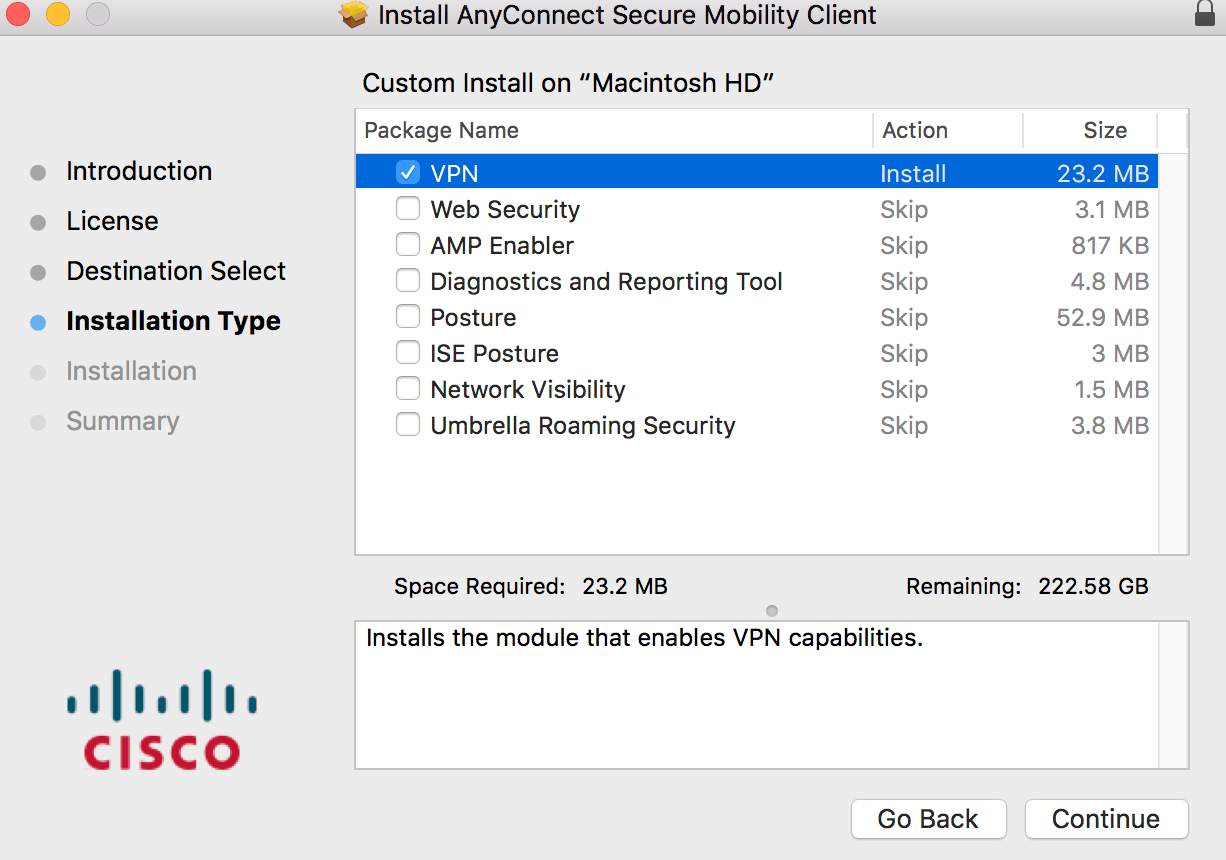

- #CISCO VPN CLIENT FOR MAC CATLINA HOW TO#
- #CISCO VPN CLIENT FOR MAC CATLINA MAC OS X#
- #CISCO VPN CLIENT FOR MAC CATLINA MAC OS#
Suggested changing the IPSec proposal lifetime within racoon to 24 hours instead of 3600 seconds. Disconnectsĭave Ma's VPN would disconnect after 45 minutes of uptime. Look in your system.log by running the Console app for hints at what might be going wrong. Monitor" in the "Utilities" folder, finding it in the process list and clicking "Quit Process" at the upper left Racoon is an IPsec key management daemon and is part of the KAME IPsec tools. That you might try killing the "racoon" process. If things seem to get hung-up and you are unable to reconnect your VPN without a reboot, Rick R mentions Password" will reveal the secret sauce after you authenticate. Double-click your IPSec Shared Secret to open up the window. Just head over to the Keychain Access application (under Applications -> Utilities)Īnd search for "VPN". You don't need the Fancy Schmancy Decoder Ring to get your settings back out of the built-in
#CISCO VPN CLIENT FOR MAC CATLINA HOW TO#
How to get your VPN settings out of the built-in mac VPN client. Visit our Sponsor if their Offer Interests You The "Other Way Around" If everything goes as planned, you should see your connection time counting up at the top of your screen.ġ1. Bask in the Warm Glow of a Native VPN Connection Try Starting your VPNĪt the top of your screen you should have a little VPN icon. Create a New VPN ConnectionĬlick "OK", make sure "Show VPN status in menu bar" is checked and click "Apply". Enter the resulting decoded password into the "Shared Secret" section of the new VPN connection and set the GroupName from above as well. Enter your Shared Secret and Group NameĬlick "Authentication Settings" back in the Network Prefrences screen.

A JavaScript implementation also exists here. Thanks to HAL-9000 at and Massar's work on cisco-decrypt.c for the magic here. Paste that sequence of characters into the fancy schmancy decoder ring below and click "Decode". Also make note of the GroupName - you'll need that in a bit as well. Get Your Encrypted Group Passwordįind that long list of letters and numbers after enc_GroupPwd= and copy it. Open up /Applications/Terminal and type the following: cd /private/etc/CiscoSystemsVPNClient/Profiles
#CISCO VPN CLIENT FOR MAC CATLINA MAC OS#
On Mac OS X, PCF files are usually found in /private/etc/CiscoSystemsVPNClient/Profiles. Unless you are OK with the system saving it. You probably don't want to enter your password To the "Server Address" setting in your System Prefrences" and enter your username under "Account Name". It doesn't matter what you set as the service name. Pick "VPN" for the Interface and set its type to "Cisco IPSec". Click on the little + button at the bottom of the window to create a new connection. Open up your System Prefrences and select "Network".

Please visit these guys if their offer interests you - they make this site possible. To the native OS X IPSec VPN by decrypting passwords saved in CiscoVPN PCF files. This tutorial shows you how to migrate from CiscoVPN
#CISCO VPN CLIENT FOR MAC CATLINA MAC OS X#
It is possible to use the IPSec VPN software included with Mac OS X instead. The proprietary CiscoVPN Mac client is somewhatīuggy.


 0 kommentar(er)
0 kommentar(er)
